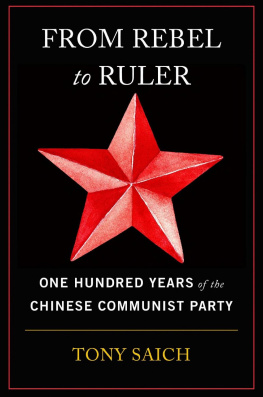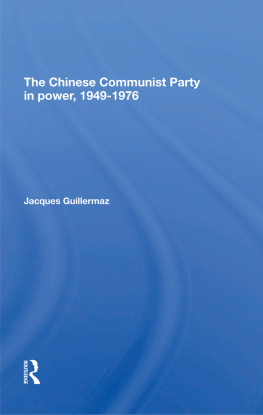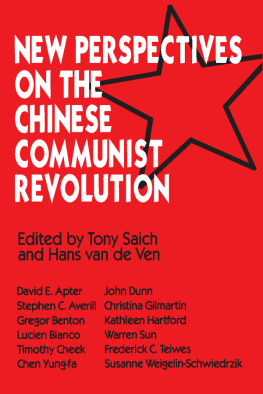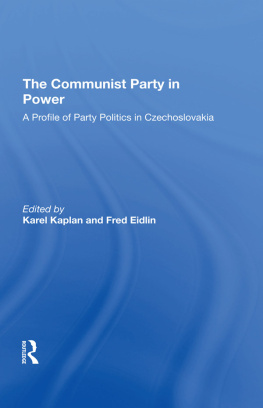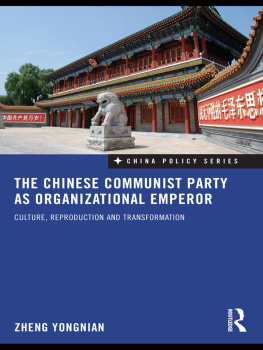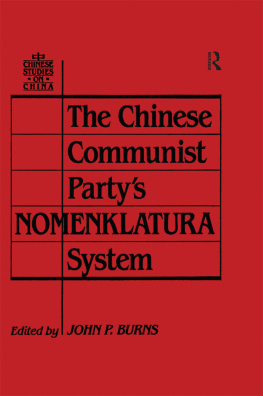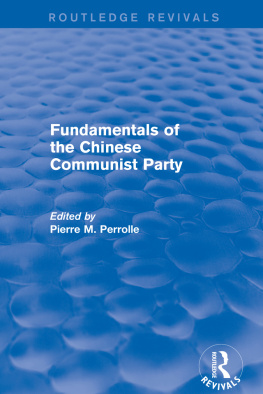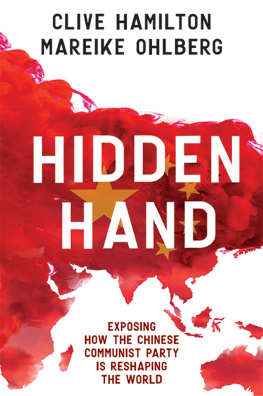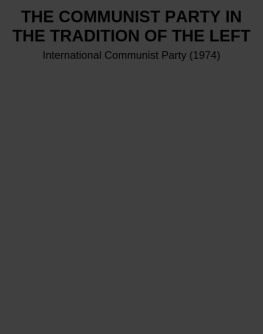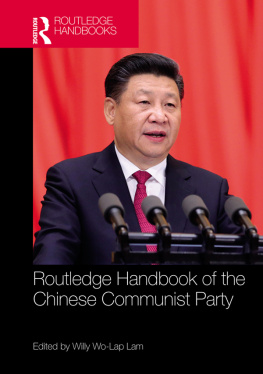FROM REBEL
to RULER
ONE HUNDRED YEARS of the
CHINESE COMMUNIST PARTY
TONY SAICH
THE BELKNAP PRESS of
HARVARD UNIVERSITY PRESS
Cambridge, Massachusetts
London, England
2021
Copyright 2021 by the President and Fellows of Harvard College
All rights reserved
Jacket design by Jill Breitbarth
978-0-674-98811-8 (cloth)
978-0-674-25959-1 (EPUB)
978-0-674-25963-8 (PDF)
The Library of Congress has cataloged the printed edition as follows:
Names: Saich, Tony, author.
Title: From rebel to ruler : one hundred years of the Chinese Communist Party / Tony Saich.
Description: Cambridge, Massachusetts : The Belknap Press of Harvard University Press, 2021. | Includes bibliographical references and index.
Identifiers: LCCN 2020043104
Subjects: LCSH: Zhongguo gong chan dangHistory. | CommunismChinaHistory. | ChinaPolitics and government19121949. | ChinaPolitics and government1949
Classification: LCC JQ1519.A5 S176 2021 | DDC 324.251/075dc23
LC record available at https://lccn.loc.gov/2020043104
For Junko, Alex, Amanda, Roscoe, and Yasmin, and my teachers David S. G. Goodman and Stuart R. Schram
Contents
APC
Agricultural Producers Cooperative
BRI
Belt and Road Initiative
CASS
Chinese Academy of Social Sciences
CC
Central Committee
CCP
Chinese Communist Party
CCRG
Central Cultural Revolution Group
CEC
Central Executive Committee
Comintern
Communist International
CPPCC
Chinese Peoples Political Consultative Conference
CPSU
Communist Party of the Soviet Union
DPP
Democratic Progressive Party
ECCI
Executive Committee of the Communist International
ERA
Eighth Route Army
GLF
Great Leap Forward
GMD
Guomindang (Nationalist Party)
NFA
New Fourth Army
NGO
nongovernmental organization
NPC
National Peoples Congress
PLA
Peoples Liberation Army
Politburo
Political Bureau
PRC
Peoples Republic of China
SARS
severe acute respiratory syndrome
SASAC
State-owned Assets Supervision and Administration
SOE
state-owned enterprise
USSR
Union of Soviet Socialist Republics
WTO
World Trade Organization
In 1976, when I was studying in China with a group of British exchange students, one of the other foreign students, a pro-Maoist, referred to us as British empiricists. With no idea what it meant, I took it as a compliment until someone pointed out that the human yo-yo Deng Xiaoping, who had been purged once again, had been denounced by his radical opponents as an empiricist. Deng was accused of underplaying ideology in favor of seeking truth from factsempiricism! The encounter made me realize the importance of how the Chinese Communist Party (CCP) uses language and ideology not only in daily life but also in factional struggles. Simple slogans point out what is correct behavior and guide how people throughout the system should behave. These slogans were particularly useful when literacy levels were low, because they were easy for the general population to absorb. The CCPs main mouthpiece, the Peoples Daily, used only a limited number of Chinese characters so that its message would reach as many people as possible.
Presiding over Diversity
There is no other political party quite like the CCP. The partys longevity, size, endurance, and ability to overcome seemingly impossible odds make it a very distinct political organization. Yet, it is difficult to define precisely what the CCP is. We can outline its structures and the duties of its members, but we cannot capture its essence this way. The partys sweep and range of control are stunning. There are party branches in almost all of the four million grassroots organizations in China (villages, townships, and urban committees), but reports frequently mention the spreading problems of corruption and unruliness. There are ninety million party members (about one-tenth of Chinas adult population, and more than the population of Germany), but it has been difficult to get many of the members, especially the wealthy, to pay their dues. What compels people to join the party? Since the CCP is the only game in town, anyone with policy or political or personal aspirations will want to join, thus sucking all the tensions within society into the party. The views of members vary widely. I have met party members who are more Stalinist than Stalin, others who are more conservative than the former British prime minister Margaret Thatcher, and yet others who describe themselves as social democrats or as belonging the democratic faction within the party. Some are among the richest folk in the land, some are true believers, and some are simply trying to advance their own careers. Around one-third of all new party recruits come from college campuses, but a 2014 survey revealed that the younger the applicant, the more likely they were to apply for membership out of self-interest. This diversity within the party explains the CCPs obsession with unity of thought and the building or coercing of conformity.
The CCP is an extremely complex organization. At the local level, in the streets and villages, there are subtle interactions between party and society that make clear-cut definitions difficult. Several decades ago, I was in a jeep meandering down a mountain road when I hit a road block. Traffic was being held up while a new bridge was being dedicated in a traditional ceremony. Puzzled, I asked those presiding over the ceremony whether the local party had given permission for the dedication. Baffled looks greeted me until one observer explained that the person in the elaborate robes was the party secretary. It was incumbent on him, as the most important figure in the village, to dedicate the new bridge that would provide a crucial link to the outside world and, the villagers hoped, bring new wealth to the locality. Such events, which occur every day throughout China, cause us to reflect on the relationship between the party and society and between tradition and modernity. Did the party secretary believe that the elaborate dedication would encourage the spirits to ensure that wealth would flow into the village? Did he feel compelled to perform the celebration to retain or build credibility among the locals? Was he bringing the word of the party into the village, or was he bringing local interests and possibly heterodox beliefs into the party? In all of these cases, it was probably both. The traditional ritual contrasted with the construction of the bridge, which represented modernity and integration of the village with the outside world. The bridge was the link to the market that had been the driving force behind the reforms of the 1980s and 1990s.
Even though the CCP has tried to penetrate society more thoroughly than its predecessors, the last seventy years, since it has taken power, have revealed the residual power of local cultures. In the southern province of Guangdong, traditional clan structures play an important role in economic and political life. In villages that I have visited in the province, large lineage halls have been restored or built anew, clearly forming the most important organizing point for political and socioeconomic exchanges. This reemergence of more overt traditional power structures has made implementation of party rule more difficult. In some villages, the party secretary and lineage head are one and the same. In Yantian village in south China, I discovered that every CCP secretary since 1949 had been a member of the same dominant lineage. This included during the period of land reform, when some clan members were executed as landlords, the Great Leap Forward (GLF) of 19581960, when communal practices and living were pushed to an extreme, and the period since 1978, as the party has allowed economic reforms. Lineage dominance over local politics is traditional, not Leninist or even class-based. Yantian party secretaries in recent years have proven adept at retaining the full support of the higher-level party authorities while protecting the interests of village members, and in so doing they have acquired considerable wealth for the village. Again, the question arises as to whether the CCP is controlling the local community through the lineage, or the lineage is using the party to protect and promote its own interests, or some combination of the two.

